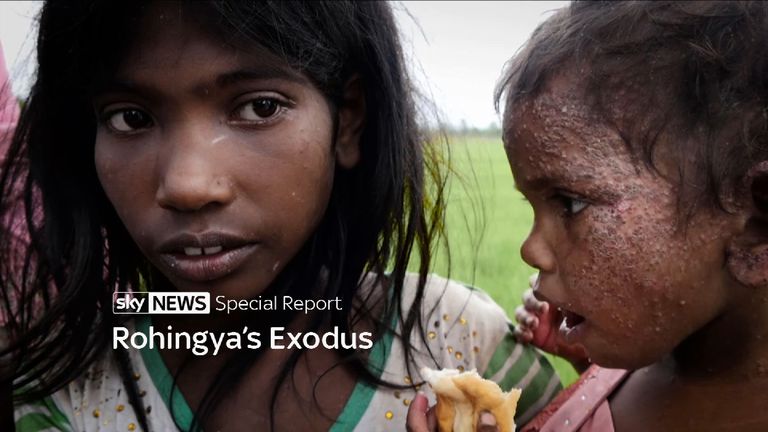'Tortured and raped': Rohingya women describe Mynamar soldiers' rampage
Troops are beating and raping women at gunpoint as they rampage through Rohingya villages, two women tell Sky News.
Tuesday 17 October 2017 15:51, UK
Rabia sits in front of me on the floor of a small hut inside Kutupolong Refugee Camp near Cox's Bazar in Bangladesh.
Light streams in through the straw walls. It makes strong shadows that streak across Rabia's partially covered face.
She is here to share her story with me.
Rabia was stripped, beaten and raped at gunpoint just for being a Rohingya in Myanmar.
"They came into the village and started firing at us," she says.
::
"We hid all our money and ornaments inside secret pockets that we had sewn inside our dresses."
She turns the hem of her dress inside out to show me some loose hanging thread and explains that was where the pocket had been sewn.
"They stripped us naked and stole all our jewellery. And this was in front of everyone.
"Many of them came, four, five ... they came in groups and one or two stood guard while the rest went in to the house to torture the women."
Rabia says the men who attacked her were Myanmar army soldiers.
"They came and found me. One grabbed my hand and took me to a path between some trees and then he pushed me.
"I fell down and then he began raping me. I started to scream but then another soldier came and pointed a gun at me.
"The soldier kept raping me until another soldier blew a whistle in the village and then they all left."
Rabia is wearing an orange headscarf across her face. From time to time during the interview it slips a little. I can see tearful eyes that are full of pain.
"What can I tell you of the torture that I've been through. If I tell you I will start crying.
"No one can live with the violence that has happened to us. We could not tolerate the torture and misery anymore and had to leave for this country.
"If we were educated or knew how to read or write I could have told you what we have gone through. But we are uneducated and I can't explain. There is no peace for us."
Listening to Rabia's heartbreaking story is Shazia.
She knows only too well the anguish Rabia is suffering because she was also raped by army soldiers.
"When the chaos started in the village we ran for our lives in different directions," says Shazia. "A large number of military soldiers came and they tortured and raped whoever they could catch.
"After our village was burned down I escaped to the hills. They got me there alone. That's where they did what they wanted to do."
She continues: "If we knew they would torture us so much we would have left much earlier. We were in peace in Burma and that's why we stayed there.
"We have been through all forms of violence: rape, burning our homes and villages, killings and stealing our land. That's why we have left our country and come to a foreign land."
Shazia's husband is listening and says nothing - he is clearly in as much pain as his wife.
He will carry the burden of a man who could not protect his wife. But against one of the most ruthless military machines in South Asia he had no chance.
It is rare for aid agencies to accuse a state of rape, but UN doctors working inside Rohingya refugee camps have reported hundreds of cases during the first wave of refugees last October and with this recent influx too.
Shazia and Rabia, not their real names, told me they wanted their story told so others like them still inside Myanmar might be saved.
They say they feel safer inside this refugee camp. And importantly, although persecuted by the outside world, these Rohingya women have not been ostracised from the community.
They think it is because the attacks have targeted so many of their women. During conflict, rape is used as a deliberate military strategy.
The Myanmar army still denies it is engaged in ethnic cleansing, but if it is ever held to account for the atrocities the testimonies of these brave women and other survivors could prove otherwise.








